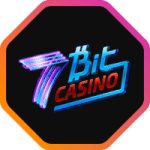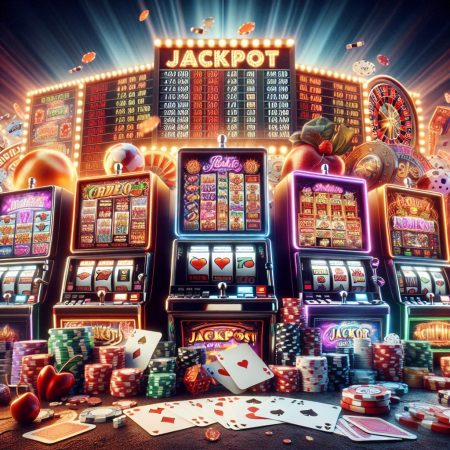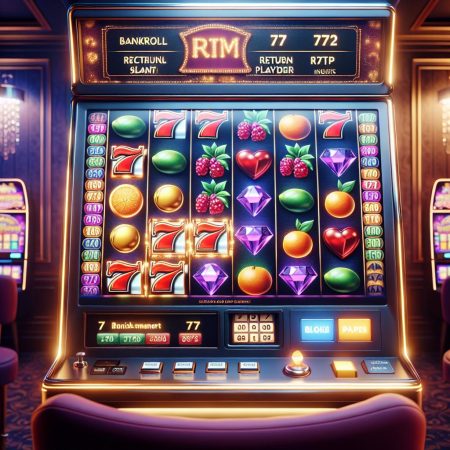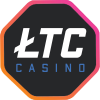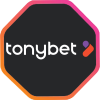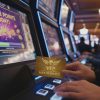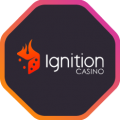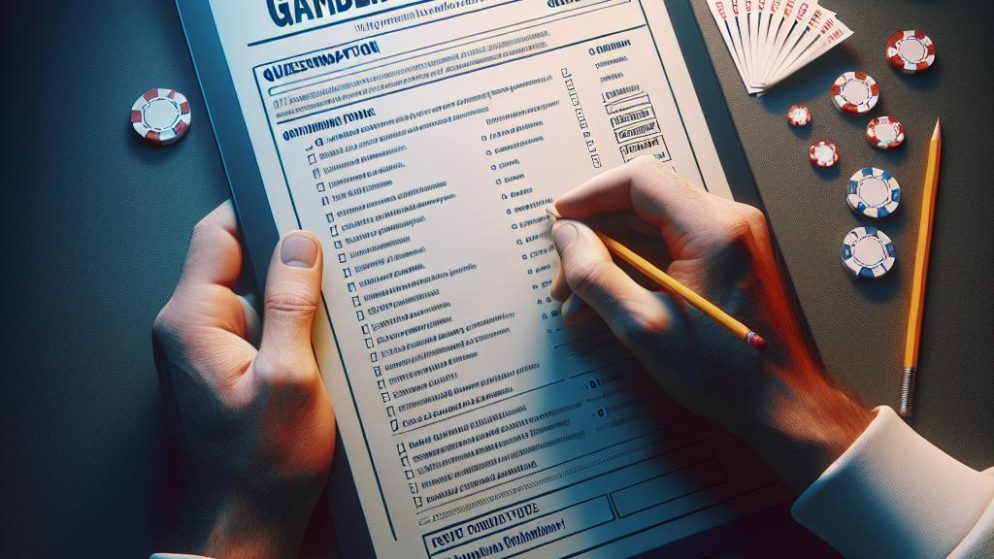
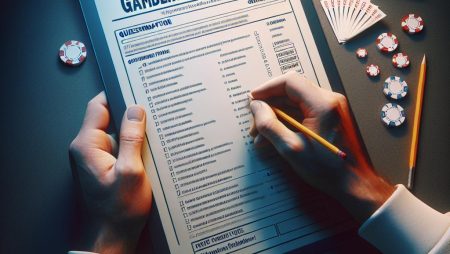
Gambling can be a fun and exciting way to spend your time, but for some, it can spiral into a serious problem. If you’ve ever wondered whether your gambling habits might be putting you at risk, you’re not alone. Many people struggle to recognize when casual betting crosses the line into addiction. This article will guide you through a simple self-test designed to help you assess your relationship with gambling. By answering a few straightforward questions, you’ll gain valuable insight into your behaviors and whether it might be time to seek help or reconsider your approach to gaming and betting.
Understanding Gambling Addiction

If you’ve ever wondered whether your love for online casino games might be crossing a line, you’re not alone. Gambling addiction, also called compulsive gambling or problem gambling, is a condition that affects millions of people worldwide. It doesn’t always start with huge bets or all-night gaming sessions; sometimes, it’s as simple as seeking the rush from a win or using gambling as a way to escape daily stresses. Before you know it, you might start feeling a pull that’s hard to resist, even when you know the odds aren’t in your favor.
What’s important to realize is that gambling addiction isn’t just about money—it’s an emotional and psychological issue that can gradually take hold without warning. Like other behavioral addictions, it hijacks the brain’s reward system, making risky bets and quick wins more appealing than ever. The resulting cycle can be tough to break, especially as the need for more excitement increases with every game.
According to Dr. Heather Wardle, a university lecturer and expert on gambling behavior, “Many people are surprised to discover how easily gambling can become a problem. It often develops quietly, making it difficult for individuals to recognize the point at which a fun hobby escalates into a harmful habit.” This silent escalation is what makes self-assessment and awareness so crucial for every online casino player.
The consequences of gambling addiction can be far-reaching, influencing not just your bank account but also your relationships, career, and mental well-being. If you find yourself gambling more than you intend or feeling anxious when you try to cut back, it may be time to step back and assess your habits. Understanding how addiction works is the first step toward making informed, healthier choices—both in online casinos and in life.
🔍 Key Signs and Symptoms of Gambling Issues
Spotting the early signs of gambling issues can make a world of difference in preventing deeper troubles. While many people enjoy placing occasional bets without harm, there are certain red flags that may indicate your gambling behaviors are veering into risky territory. It’s important to pay attention to how you feel about gambling, how much time and money you’re spending, and the impact it has on your daily life.
Frequently, warning signs might seem subtle at first. You might notice that you’re thinking about gambling more than usual, feeling restless or irritable when you’re not able to play, or chasing losses by making bigger bets than you planned. It’s common for people with developing issues to downplay or hide how much they gamble—even from close friends and family. Over time, a growing urge to keep playing, despite mounting financial or personal consequences, can indicate a more serious problem.
To help you recognize these warning signs, here’s a quick overview of common gambling issue symptoms:
| Sign or Symptom | Description |
|---|---|
| Preoccupation with Gambling | Constantly thinking about gambling activities, past wins, or planning the next game. |
| Increasing Bets | Needing to bet larger amounts to achieve the same thrill or excitement. |
| Difficulty Cutting Back | Unsuccessful attempts to reduce or stop gambling, despite intentions. |
| Chasing Losses | Returning repeatedly to try and win back money already lost. |
| Gambling to Escape | Using gambling as a way to avoid stress, anxiety, or other problems. |
| Neglecting Responsibilities | Missing work, neglecting personal obligations, or losing interest in other hobbies. |
| Secrecy and Lying | Hiding or being dishonest with others about gambling behavior and losses. |
If any of these tendencies sound familiar, it’s worth taking a moment to reflect on your relationship with gambling. Recognizing these symptoms early can be a major step toward protecting your well-being and can help you act before things get out of hand.
🧠 How Gambling Affects the Brain and Behavior
When you place a bet or spin the reels at an online casino, your brain gets a powerful jolt of excitement. This rush comes from dopamine, a neurotransmitter popularly known as the “feel-good” chemical. Every win—no matter how small—releases a burst of dopamine, igniting a sense of pleasure and encouraging you to chase that winning feeling again. Over time, this cycle can condition you to associate gambling with happiness and reward, fueling the desire to keep playing even when luck isn’t on your side.
One fascinating aspect of gambling’s impact is how it can shift your decision-making. As the stakes rise, the brain can start to treat losses differently, triggering what experts call “loss chasing.” Instead of cutting your losses, you may find yourself wagering more in an attempt to break even. This behavior is rooted in how our brains process risk and reward, sometimes overriding logical thinking in favor of the promise of a big win.
Gambling also plays tricks on your perception and memory. You might remember your big wins vividly while conveniently forgetting the losses, which can create a distorted view of how successful you really are. The constant mix of anticipation, hope, disappointment, and euphoria can ultimately lead to compulsive patterns that are hard to break without conscious effort or support.
| Brain Region | Main Function | Role in Gambling |
|---|---|---|
| Prefrontal Cortex | Decision Making | Can become impaired, leading to riskier choices and poor impulse control |
| Amygdala | Emotional Processing | Heightens emotional responses to wins and losses, reinforcing addictive behavior |
| Nucleus Accumbens | Pleasure & Reward | Releases dopamine during wins, motivates repeat behaviors |
| Hippocampus | Memory Formation | Repairs selective memories of wins, helping justify continued betting |
Over time, the repeated search for dopamine highs can actually alter your brain’s reward pathways, making it increasingly difficult to stop gambling—even when you truly want to. This is a powerful reminder that gambling addiction is not just about willpower; it’s about real changes to how your brain functions. Recognizing these changes is the first step to regaining control and seeking healthier sources of excitement and fulfillment.
Self-Assessment: The Gambling Risk Test
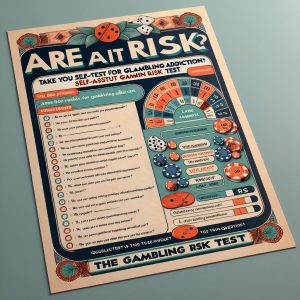
If you’re uncertain about your gambling habits and wondering whether they’re still within healthy boundaries, a self-assessment can be an invaluable tool. Taking a moment to honestly evaluate your behaviors not only increases self-awareness but also empowers you to make informed choices about your online casino activities. A gambling risk test isn’t meant to judge; it’s here to help you spot patterns, triggers, or warning signs before they develop into something more problematic.
The process is simple: by reflecting on key questions about your gambling habits, emotions, and motivations, you can start to see the bigger picture. Transparency is critical—be as honest as possible with your answers. Remember, this self-test is for your eyes only and is designed to guide your own personal growth and decision-making. Here are some of the most effective questions you can ask yourself right now:
- Do you ever find yourself betting more than you originally intended?
- Have you tried to cut back on gambling but found it difficult or impossible?
- Do you feel restless, irritable, or anxious if you are unable to gamble?
- Are you chasing losses by gambling more, hoping to recover previous losses?
- Have friends or family expressed concern about your gambling?
- Do you borrow money, sell possessions, or dip into funds needed for essentials to continue gambling?
- Is gambling affecting your relationships, job, or studies?
- Do you use gambling as a way to escape from stress or negative emotions?
It can also help to track your responses over time or use a simple scoring system. For example, answering “yes” to multiple questions may suggest a higher level of risk. While this is not a clinical diagnosis, it strongly indicates when it may be time to seek advice or support.
| Number of “Yes” Answers | Risk Level | Suggested Action |
|---|---|---|
| 0-1 | Low | Continue to monitor your habits; enjoy responsibly |
| 2-3 | Moderate | Be cautious, consider setting limits, and reflect on potential triggers |
| 4-5 | High | Monitor closely; consider reaching out to a support resource |
| 6 or more | Very High | Seek professional help; take a break and talk to someone you trust |
No matter where you land on this scale, remember that you are not alone. Recognizing a pattern now gives you the best opportunity to make positive changes and, if necessary, reach out for help. Even just talking to someone about your concerns can lighten the burden and open the door to healthier habits. As the famous psychologist Carl Jung once said, “Until you make the unconscious conscious, it will direct your life and you will call it fate.” Taking a self-test is a powerful way to bring those hidden patterns into the light.
📝 Questions to Ask Yourself
It’s easy to overlook the subtle signals that your gambling might be becoming more than just a source of entertainment. Many online casino players don’t consciously analyze their habits, but a sincere self-examination can reveal patterns that may otherwise go unnoticed. Reflecting on your behaviors and feelings is a vital first step—one that could protect your well-being and those around you.
Consider how you spend your time and what role gambling plays in your daily life. Is it just an occasional pastime, or have you noticed yourself prioritizing it over plans with friends, family, or even essential responsibilities? Pay attention to your emotional state during and after you play, as well. Are you merely enjoying the excitement, or do you rely on gambling to lift your mood or escape from stress?
Another important aspect is your reaction to wins and losses. Are you able to walk away after a loss, or do you feel a strong urge to keep playing until you recover what you’ve lost? Do you find yourself betting more than you can comfortably afford or using money set aside for bills or necessities? These are crucial areas to examine, as they signal how much control you may—or may not—have over your gambling choices.
| Question | Why It Matters |
|---|---|
| Do I feel anxious or restless if I can’t gamble? | Discomfort in the absence of gambling may signal dependency and loss of control. |
| Have I ever lied about the amount of money or time spent gambling? | Dishonesty often indicates shame or guilt, both warning signs of problematic behavior. |
| Have I missed important events or neglected responsibilities to gamble? | Ignoring daily duties shows gambling is becoming a priority over life commitments. |
| Do I chase losses in the hope of breaking even? | Chasing losses is a classic problem gambling marker that can deepen financial troubles. |
| Is gambling negatively affecting my mood, finances, or relationships? | Significant impacts here suggest a need for intervention and support. |
Taking the time to answer these questions honestly is a proactive and healthy step for any online casino player. If several responses raise concerns, it’s not a sign of weakness—rather, it’s an opportunity for growth and positive change. With self-awareness, you are already better positioned to maintain control and enjoy gambling as the entertaining pastime it’s meant to be.
⚖️ Interpreting Your Self-Test Results
After taking a closer look at your answers in the self-assessment, it’s important to give yourself some space to honestly interpret what your responses might mean. The goal here isn’t to create anxiety or self-doubt, but rather to help you gain clarity about the role gambling is playing in your daily life. Everyone brings their own personal history and circumstances to the table, so even if you checked off just a few risk indicators, paying attention is always a smart move. Understanding where you stand helps you take appropriate next steps—whether you’re free to enjoy online casino games with confidence or you could benefit from putting a few safeguards in place.
If your answers show a pattern of multiple “yes” responses, it’s a gentle signal that your gambling habits may be crossing into risky territory. You don’t need to panic, but consider setting limits on your spending or time invested in casino activities. Being proactive—by using deposit limits or taking regular breaks—can help prevent things from escalating. For some, seeking advice from responsible gambling support services or chatting with a trusted friend can make a significant difference.
A high tally of concerning responses might mean you’re already facing negative impacts. In this case, it’s crucial not to ignore the signs. Accessing professional resources or support groups can guide you through reshaping your relationship with gambling and regaining a healthy balance. There’s no shame in asking for help, and reaching out is a courageous step toward protecting your well-being. As NBA legend Michael Jordan once said, “If you quit once, it becomes a habit. Never quit!”—meaning persistence in seeking the life you want is always worth the effort.
It’s wise to routinely assess your gambling patterns, especially if you’ve noticed emotional or financial stress creeping into your life. Remember: self-awareness is a powerful tool, and tackling potential challenges head-on is the best way to ensure that gambling remains a fun and entertaining pastime, not a source of trouble. No matter where you fall on the spectrum, there’s always a path forward—one that safeguards both your enjoyment and your future.
Consequences of Ignoring Gambling Problems
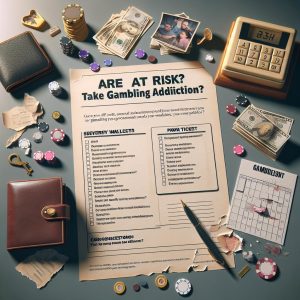
Ignoring the warning signs of gambling problems can lead to consequences that reach far beyond the casino floor. When individuals brush off early red flags—like mounting debts, growing secrecy, or emotional distress—the risks tend to escalate and multiply over time. Financial hardship is often the first major consequence, as losses pile up and desperate attempts to recover them fuel even riskier decisions. This can result in maxed-out credit cards, depleted savings accounts, and even questionable loans, turning money worries into a source of daily anxiety.
But the impact isn’t just financial. Relationships with loved ones can become strained or even break down completely as trust erodes and priorities shift. Frequent arguments, broken promises, and time spent away from family or friends in favor of gambling can leave lasting scars. Workplace performance may suffer too, with increased absences, lack of focus, or missed deadlines leading to the risk of job loss and further insecurity.
Mental and emotional health also take a significant hit. The stress of hiding gambling activities, coping with financial chaos, or feelings of guilt and shame can trigger anxiety, depression, and even thoughts of hopelessness. Over time, some may resort to unhealthy coping mechanisms, turning to alcohol or other substances to escape the pressure.
It’s important to realize that unchecked gambling issues rarely resolve on their own. Without intervention and honest self-assessment, the negative effects often intensify, perpetuating a cycle that’s increasingly difficult to escape. The earlier you recognize the risks and take steps to address them, the better your chances are of maintaining control and protecting every area of your well-being.
| Category | Examples | Potential Long-Term Impact |
|---|---|---|
| Financial | Debt accumulation, missed bills, asset sales | Bankruptcy, legal trouble, homelessness |
| Relationships | Broken trust, frequent conflicts, social isolation | Divorce, loss of friendships, family breakdown |
| Mental Health | Anxiety, depression, low self-worth | Substance abuse, self-harm, suicidal thoughts |
| Career | Reduced performance, absenteeism, job loss | Unemployment, damaged reputation, limited prospects |
💸 Impact on Finances and Debts
If you’re an online casino player, it’s easy to underestimate how quickly gambling can affect your finances. Small, regular bets can quietly accumulate into significant sums before you even realize it. With the thrill of chasing wins and the convenience of online payment methods, it’s tempting to lose sight of your broader financial picture. Before long, you might find your bankroll depleted, your credit card balances creeping up, and your savings unexpectedly shrinking. This isn’t just about losing a few bets—it’s about the real risk of falling into a cycle of debt that’s increasingly hard to escape.
What makes things more complicated is that the urge to recover lost money often leads gamblers to make riskier bets in hopes of a big win. Unfortunately, this “chasing losses” mindset rarely ends well. Instead of breaking even, many players dig themselves deeper into debt, relying on loans, cash advances, or even borrowing from friends and family. The stress of mounting financial pressure can quickly overshadow any enjoyment you once got from playing, creating an endless loop that’s tough to break.
The ripple effects go even further than just your personal bank account. Financial strain can strain relationships, affect your credit score, and limit your ability to cover essentials like rent, bills, or groceries. In some cases, the financial impact of gambling problems can lead to serious long-term consequences, including bankruptcy or legal troubles. Understanding how easily these pitfalls can develop is a crucial step in maintaining a healthy relationship with online casinos.
| Behavior | Financial Outcome | Long-Term Risk |
|---|---|---|
| Using credit cards for deposits | Increased debt and accruing interest | Poor credit score, unmanageable loans |
| Frequent cash withdrawals | Reduced savings, hidden spending | Emergency fund depletion |
| Borrowing money to gamble | Personal debts and relationship stress | Broken trust, financial disputes |
| Skipping bills to place bets | Late fees and service interruptions | Utilities shut off, eviction risk |
Simply keeping track of your gambling expenses and setting clear limits on your spending are some of the best ways to avoid financial trouble. Monitoring your account activity, using budgeting apps, and discussing your habits with someone you trust can be a helpful strategy to maintain financial well-being. Recognizing the risks and taking proactive steps now can protect your future and keep online gaming a fun, safe experience.
❤️ Strain on Relationships and Mental Health
When gambling moves beyond a harmless pastime, the effects often ripple into your personal life—especially your relationships and emotional well-being. Family members, partners, and close friends may begin to notice changes before you do: perhaps you’re more withdrawn, irritable, or preoccupied, and it’s harder for them to connect with you. Trust can become a casualty as well, especially if you find yourself hiding your gambling activities or the extent of your losses. As the secrecy grows, so do misunderstandings and resentments, creating a wedge between you and the people who care most.
The emotional impact of problem gambling goes hand-in-hand with these relational struggles. Mood swings, stress, and guilt can all increase as the stakes get higher and losses mount. People caught in this cycle commonly experience low self-esteem and lingering anxiety, which may spill over into other areas of their life—making it tough to focus at work, sleep well at night, or enjoy non-gambling hobbies. It isn’t unusual for problem gamblers to face symptoms of depression or to use gambling as a way to escape from other, deeper issues.
A healthy support system is crucial for emotional resilience, but gambling struggles can erode those connections, leaving players feeling isolated or misunderstood. If you notice tension developing with your loved ones, or your own mental health takes a downturn, it’s a sign to pause and take stock. Open communication, honesty, and seeking outside help can make a big difference in breaking this cycle and beginning the journey back to balance.
| Area of Life | Typical Symptoms | Potential Long-Term Effects |
|---|---|---|
| Romantic Relationships | Breakdown of trust, frequent arguments, emotional distance | Separation, divorce, chronic conflict |
| Friendships & Family | Isolation, hidden behaviors, disrupted communication | Loss of support network, estrangement |
| Mental Health | Anxiety, depression, low self-worth, guilt | Clinical depression, substance abuse, suicidal thoughts |
Risk Factors: Who Is Most Vulnerable?
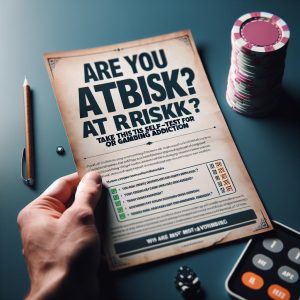
Gambling addiction doesn’t discriminate, but certain risk factors can increase a person’s vulnerability. Understanding who is most at risk helps in crafting effective prevention strategies and encourages those in vulnerable groups to pay closer attention to their habits. Factors such as age, personality type, and even the games you gravitate toward can play a significant role in your susceptibility to developing gambling problems.
Youth and young adults are particularly vulnerable, as their brains are still developing the regions responsible for impulse control and decision-making. Those with a history of mental health issues, such as depression or anxiety, are also more at risk, as they may use gambling as a coping mechanism. Being exposed to gambling at an early age—whether through family, social circles, or online platforms—can further increase the odds of problematic behaviors later on.
Another key factor is personality. People who are naturally more impulsive, competitive, or prone to seeking new sensations may find it harder to walk away after a loss. If you find yourself someone who thrives on excitement or struggles with boredom, online casino games might be especially tempting. Likewise, individuals who are socially isolated, dealing with major life changes, or coping with trauma may turn to gambling as a distraction or a way to fill a void.
| Risk Factor | How It Contributes |
|---|---|
| Age (Teens & Young Adults) | Immature impulse control and greater exposure to online platforms |
| Mental Health Challenges | Increased use of gambling as a coping method for stress or anxiety |
| Early Gambling Exposure | Normalizes risky behaviors and reduces perceived danger |
| Social Isolation | Turning to gambling for social interaction or to fill loneliness |
| Personality Traits (Impulsiveness, Sensation Seeking) | Higher likelihood of chasing wins and taking risks |
| Life Changes or Trauma | Gambling used as an emotional escape or distraction |
Recognizing these risk factors doesn’t mean you’re destined to develop a problem. Instead, it gives you the upper hand—helping you stay self-aware and, if needed, seek guidance before issues escalate. If you identify with one or more of these factors, consider setting stricter personal boundaries, using self-exclusion tools, or talking with someone you trust about your gaming habits. Prevention and early recognition are always more effective than waiting until things become overwhelming.
👥 Demographics and Personality Traits
When it comes to understanding who might be especially at risk of developing gambling problems, it’s important to look beyond just habits and think about the broader picture of demographics and personality. Some factors may be outside your control, such as age or family background, while others are closely tied to your personal tendencies and coping styles. Online casino operators themselves often use demographic data to build more captivating experiences—so knowing where you might fall on the risk spectrum helps you stay aware and in control.
Research consistently finds that younger adults are more susceptible to gambling-related issues. This isn’t just because of exposure to online gaming or flashy casino sites, but also because the decision-making centers in a young person’s brain are still under construction. Young males, in particular, tend to report higher rates of problem gambling, likely influenced by social norms and the appeal of risk-taking behaviors. Meanwhile, those from families with a history of gambling, substance abuse, or mental health challenges also face an increased likelihood of trouble themselves.
Personality traits can be equally influential. People who are naturally impulsive, crave novelty, or easily succumb to boredom may gravitate toward gambling’s fast-paced environment. Competitive personalities might chase losses more aggressively, refusing to walk away after a losing streak. On the other hand, someone who is introverted or feeling isolated could turn to online gambling as a way to connect or find distraction, without ever setting foot in a physical casino.
| Risk Category | Common Characteristics | Potential Triggers |
|---|---|---|
| Age | 18-35, especially males | Peer pressure, digital advertising, eSports betting |
| Family History | Close relatives with gambling or addiction issues | Genetic predisposition, learned behaviors |
| Personality | Impulsiveness, sensation seeking, competitiveness | Boredom, thrill-seeking, desire to outdo others |
| Mental Health | History of anxiety, depression, trauma | Stress, self-medication, need for escape |
Understanding these risk factors doesn’t mean you have to avoid online casinos entirely. Instead, think of it as having extra tools in your responsible gaming toolkit. If you notice yourself fitting into any of these demographic or personality categories, you can be proactive—set betting limits, take regular breaks, or reach out to a support service if things start feeling overwhelming. Ultimately, self-awareness is the key to a healthy relationship with gambling, keeping all the fun without the risk.
🎲 The Role of Online Casinos Like BitStarz, 7Bit, and Wildz
Online casinos such as BitStarz, 7Bit, and Wildz have transformed the landscape of gambling, making it more accessible and appealing than ever before. With just a smartphone or computer, players can immerse themselves in a world of endless games, bonuses, and tournaments anytime, anywhere. These platforms are masters at blending cutting-edge graphics, enticing reward systems, and interactive features, all of which are designed to heighten engagement and nurture repeat play. For many, this level of convenience adds fun and flexibility to their experience, but it also introduces unique risks.
The structure of modern online casinos is carefully crafted to maximize excitement. Features like instant deposits, free spins, live dealer games, and loyalty programs keep adrenaline high and players coming back for more. BitStarz, for example, offers lightning-fast payouts and a wide array of cryptocurrency payment options, while 7Bit and Wildz emphasize generous welcome bonuses and daily missions that foster a sense of progress and achievement. The social aspects—such as leaderboards or chat rooms—add another compelling layer, making it easy to lose track of time during play.
While these innovations have pushed the limits of entertainment, they can also accelerate problematic behaviors for vulnerable players. The constant availability and never-ending stream of incentives can trigger urges to chase losses or spend more than intended, particularly when combined with the seamless transaction systems these casinos provide. This is why reputable platforms invest in responsible gambling tools, including self-exclusion options, deposit limits, and access to professional help, trying to strike a balance between profit and player safety.
| Casino | Key Features | Responsible Gambling Tools |
|---|---|---|
| BitStarz | Fast withdrawals, crypto-friendly, wide game selection | Self-exclusion, reality checks, deposit limits |
| 7Bit | Retro theme, daily bonuses, crypto support, provably fair games | Flexible limits, cooling-off periods, game history |
| Wildz | Personalized rewards, gamification, real-time tournaments | Session time reminders, self-assessment tools, support contacts |
If you love the thrill and variety these platforms offer, it’s vital to keep an eye on your habits and use the available tools to stay within healthy boundaries. Awareness of how the unique design of your favorite online casinos can influence behavior is an essential step toward enjoyable and responsible gaming. As technology advances, being proactive in managing your risk is the best way to keep your gaming experience both safe and entertaining.
Taking Action: Getting Help and Support
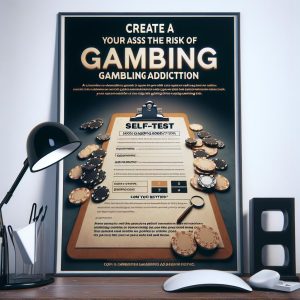
If you’ve recognized that gambling is starting to impact your life or you’ve scored high on a self-assessment, the most important step you can take is reaching out for help. Taking action may feel daunting at first, but the earlier you seek support, the easier it becomes to regain balance and rebuild healthier habits. Remember, gambling addiction is a common struggle, and there are people and organizations dedicated to helping you find your footing—no matter what stage you’re at in your journey.
Help and support come in many forms. For some, talking openly with a trusted friend or family member is a great way to break the cycle of secrecy and shame. Others benefit from structured programs, counseling, or group therapy sessions, which focus on strategies for managing urges, repairing relationships, and restoring emotional wellbeing. Professional therapists who specialize in addictive behaviors can provide personalized guidance and coping tools designed specifically for problem gambling.
Today’s online world offers additional options, including anonymous chat lines, helplines, and digital self-exclusion services available right on your favorite casino sites. Many online casinos partner with organizations dedicated to responsible gambling, making it easier than ever to set spending limits, lock your account for a cooling-off period, or access expert advice directly from the platform. These resources are confidential and judgment-free, focused solely on helping you regain control and lead a more satisfying life.
Here’s a quick overview of practical support resources for those concerned about gambling addiction:
| Support Resource | Description | How to Access |
|---|---|---|
| Professional Counseling | Certified therapists help identify triggers and develop coping strategies tailored for gambling addiction. | In-person, online platforms, or referrals from healthcare providers. |
| Peer Support Groups | Regular meetings with others facing similar challenges (e.g., Gamblers Anonymous). | Local chapters, online meetings, dedicated apps. |
| Helplines | 24/7 crisis phone or text support staffed by trained advisors. | National or regional helpline numbers, available on responsible gambling organizations’ websites. |
| Online Casino Tools | Self-exclusion, deposit limits, time alerts, and reality checks built into most reputable platforms. | Directly through your casino account settings or support pages. |
| Educational Resources | Articles, self-tests, and guides to understanding and managing gambling risks. | Responsible gambling sections on casino sites, non-profit organizations online. |
No matter which path you choose, remember you’re not alone—help is always closer than you think. Even a small step, such as sending a text or making a call, can be the beginning of lasting change. As media personality Oprah Winfrey once said, “The greatest discovery of all time is that a person can change his future by merely changing his attitude.” A supportive network and practical resources can help turn that attitude into action, so you can enjoy life—and gaming—on your own terms.
🤝 Support Networks and Resources
When facing the challenges of gambling addiction, one of the most transformative steps a person can take is reaching out to a support network or resource. You’re never alone on this journey—there are numerous organizations, groups, and digital services specifically established to guide you through recovery and back to a balanced life. These support systems are designed not just for those grappling with the addiction, but also for friends and family members seeking ways to help a loved one. Whether you’re looking for a listening ear, practical advice, or a structured recovery plan, the right resources can make all the difference.
One of the strongest assets in your recovery toolkit is peer support. There are organizations around the world—like Gamblers Anonymous and GamCare—that facilitate group meetings where people share their experiences and strategies for overcoming gambling urges. The camaraderie and understanding you’ll find here can provide a powerful source of hope and motivation. For many, learning from others who have successfully managed their recovery ignites the confidence to take positive steps and work towards their own goals.
You’ll also find an array of helplines and chat services that offer immediate, confidential assistance. These services are staffed by trained professionals who can listen to your concerns, provide specific advice, and connect you to further treatment options if needed. Many online casinos now offer built-in support features—like self-exclusion tools, deposit limits, and pop-up reminders—to help you manage your play from within your account dashboard. Combined with self-help guides and mobile apps for tracking your habits, today’s digital age makes it easier than ever to access help at the click of a button.
| Resource | Type | How It Helps |
|---|---|---|
| Gamblers Anonymous | Peer Support Group | Facilitates group meetings for discussing experiences and recovery strategies. |
| National Gambling Helpline | 24/7 Phone and Chat Support | Offers confidential advice and crisis intervention from trained advisors. |
| Online Casino Responsible Gambling Tools | Built-in Platform Features | Includes self-exclusion, deposit limits, and session reminders. |
| Self-Help Mobile Apps | Digital Tools | Help track gambling behavior and set personal goals. |
| GamCare | Counseling & Information | Provides online and phone support, plus access to free counseling. |
Whether you prefer the anonymity of an online chat, the structure of regular group meetings, or expert advice from a counselor, you have a wide range of choices. The most important thing is to take the first step—no matter how small. Reaching out doesn’t mean you’ve lost control; it means you’re ready to take it back. As renowned addiction expert Dr. Mark Griffiths once said, “You can’t start the next chapter of your life if you keep re-reading the last one.” With the right support, a brighter chapter is always within reach.
📱 Digital Tools and Helplines for Recovery
In today’s connected world, seeking help for gambling addiction has never been more accessible or private. Innovative digital tools and helplines offer a lifeline to those looking to regain control, providing round-the-clock support at your fingertips. Whether you’re comfortable chatting with someone anonymously or prefer monitoring your habits through technology, there’s a solution ready to meet your needs.
A growing range of mobile apps and online platforms help track gambling activity, set boundaries, and offer reminders to take healthy breaks. Many apps can provide personalized insights, notification systems, and motivational tips, making mindful gaming easier than ever. Reputable online casinos often integrate these features, so players can activate deposit limits, reality checks, or even temporary self-exclusion straight from their user dashboard.
Helplines are another invaluable resource, providing immediate, confidential support whether you’re in crisis or just need someone to talk to. These services connect you with trained advisors who understand the unique challenges of gambling addiction, offering compassionate guidance and actionable steps. Since support is available via both calls and text messages, you can reach out in the way that feels most comfortable to you—no awkward conversations required.
| Tool/Service | Purpose | How to Access |
|---|---|---|
| Gambling Tracking Apps | Monitor habits, set spend limits, receive reminders | Download via App Store or Google Play |
| National Gambling Helplines | 24/7 confidential advice and guidance | Phone or SMS (number varies by country) |
| Online Self-Exclusion Programs | Block access to gambling sites for chosen period | Register on casino sites or official self-exclusion services |
| Website Live Chats | Quick text-based support with trained staff | Available directly on responsible gambling websites |
| Counseling & Peer Support Forums | Join group discussions or access professional therapists | Online therapy platforms and dedicated forums |
No matter where you live or how urgent your needs may feel, these digital resources provide safe, confidential, and effective pathways to recovery. With help always so close, taking the first step toward change is easier—and more supported—than ever before.
Conclusion
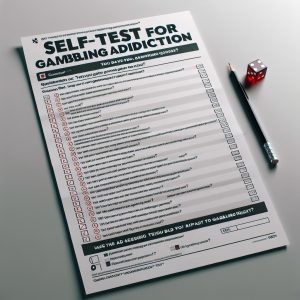
Deciding to assess your gambling habits is a smart, proactive measure that empowers you to maintain a healthy and enjoyable relationship with online gaming. When you take a moment to check in with yourself and recognize any emerging patterns, you hand yourself the tools for long-term control. It is never too late—or too early—to ask honest questions, pay attention to shifts in your behavior, or reach out for support if you notice warning signs. Responsible gambling is all about balance: understanding where fun ends and potential risk begins.
Modern online casinos have made gaming more engaging than ever, but with this accessibility comes the personal responsibility to safeguard your well-being. No one is immune to the subtle influences of exciting digital interfaces, reward systems, or the urge to chase that next big win. By leveraging available support networks, digital apps, and built-in account protections, you can manage your play, mitigate risks, and ensure the experience remains positive.
If you’ve identified any areas of concern, remember that self-awareness is the first and most crucial step toward a healthier path. Helpful tools and caring professionals are available to guide you, should you ever need a helping hand. As Oprah Winfrey wisely put it, “The greatest discovery of all time is that a person can change his future by merely changing his attitude.” A mindful approach to gambling—one grounded in self-reflection and openness to support—will help you confidently shape your own future, both online and beyond.
- Regular self-assessments keep you aware of any changes in gambling behavior.
- Utilizing responsible gambling tools can prevent problems before they start.
- Don’t hesitate to reach out for support—help is always available.
- Enjoy online casino gaming as a form of entertainment, not a solution to financial or emotional challenges.
